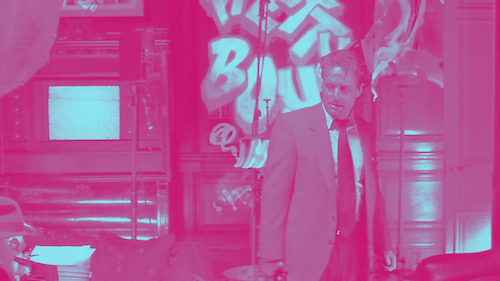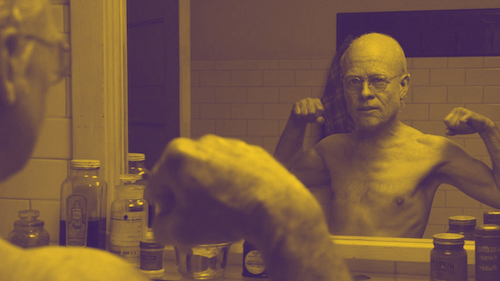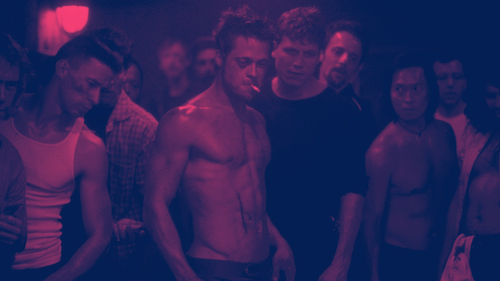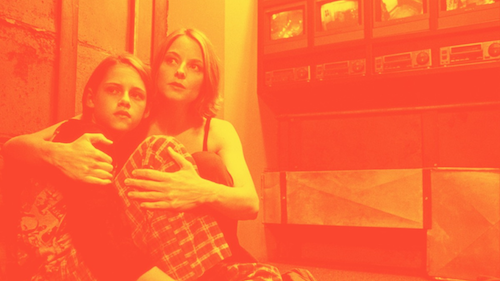Filmography Worship: Ranking Every David Fincher Film
Written by Andreas Babiolakis
Filmography Worship is a series where we review every single feature of filmmakers that have made our Wall of Directors
David Andrew Leo Fincher is an American filmmaker best associated with films about crime, psychoses, obsessions, and the moral compass's fickleness in the overall human experience. This wasn’t always the case: Fincher’s previous life was that of a highly coveted director for music videos, having worked with the likes of Madonna (whose music video for “Express Yourself” is one-of-a-kind and a tribute by Fincher to Fritz Lang’s Metropolis), Michael Jackson, Rick Springfield, Billy Idol, and more. He first got into filmmaking when he was hired to direct the impossibly tall order known as Alien³: the experience was plagued by studio involvement so heavily that it was almost a one-and-done deal for Fincher who never wanted to make motion pictures again. Fortunately, he kept going and became a voice of a generation.
What makes Fincher so special? The most obvious answers would be the grittiness of his films, the boiling down of grey areas in moral dilemmas to the point of mystical delirium, and the depictions of people becoming mentally broken piece by piece. It’s clear that the actual foundations for Fincher’s expertise come from his years as a music video guru, and the first telltale signs are the opening credits sequences to most of his films; they usher you into films with rhythm, flair, and tenacity that most filmmakers don’t even bother to have with these intro titles. Even Alien³ has fantastic opening credits that prepare you for the film ahead. You can see the reasons why these credits succeed throughout the rest of Fincher’s films. He has an acute understanding of beat, flow, and timing, all from his music video background. This translates to precise pacing, the manipulation of tone, and the gripping of audiences and their expectations. Despite their chilling exteriors, Fincher makes films that connect with audiences like music does; once he burrows into your psyche, many of his films feel intrusive and sickening. As audiences, we’ve grown to love this.
Fincher channels the sickest inner thoughts people have and tries to contextualize them. A master of the serial killer thriller, Fincher brings us into scenarios that have shaken up audiences time and time again, with the majority of his films only garnering adoration after their initial releases; sometimes we just need a second to marinate on what we’ve just seen. While other filmmakers may be more challenging narratively or aesthetically, Fincher has the ability to make films that feel applicable to the masses while prioritizing their moral epicentres as the most challenging things about them. A film like Zodiac is gorgeous and flows nicely as any mainstream feature would, and yet it still shakes us at our cores because of the question we are forced to grapple with: do we continue to drive ourselves insane to find a serial killer who is missing in action or may not even be alive anymore? There’s no easy answer here. We feel responsible for those who lost their lives to bring resolution to their families and society. We also see three different protagonists bring themselves to various versions of sickness over this endless case that hasn’t had any leads in years. Fincher makes you face this possibility dead on through a film that feels almost like a trap to get you to this place.
Even when Fincher isn’t making crime films, he is still posing the questions surrounding how we live life as complicated animals. If he was observing us as creatures of habit and art through his music videos, his feature films are full-on dissections of civilization in anthropological, political, and philosophical dossiers. No matter what the premise is, every single film of his has a protagonist granted or cursed with a paradoxical predicament, be it a hunt for a killer that puts others in danger, creative geniuses that get the best of others and themselves, or even a person who ages in reverse trying to figure out what life truly means for them. In the same way that Fincher finds human beings fascinatingly multifaceted animals, we find his films curiously layered and meticulous. From coffee cups in every shot to killers in plain sight, Fincher is also a master of hidden, subliminal details. He clearly understands how human behaviours work and how they can be toyed with.
Only one film by Fincher is considerably mediocre (this asterisk will be discussed momentarily). This is a film that Fincher himself has disowned. Otherwise, he has made nothing but good-to-brilliant films. Even still, outside of the middle section of this ranking (which I juggled around for days until this list finally got published), the lowest and highest of his filmography fell right into place for me. While always provocative and fascinating, some films by Fincher are outright successes with what they set out to accomplish. Some films, while noble attempts, are flawed but with enough of Fincher’s signature edge, ruthlessness, and dedication to warrant being seen at least once. It’s time to get ugly with style. Here are the feature films of David Fincher ranked from worst to best.
12. Alien³
This was obvious. For years I have sworn off the initial cut of Alien³ because it felt aimless, dull, and misguided. Even though Fincher himself wants nothing to do with the film, Fox went ahead and tried to rectify the abomination of the first release by resurrecting his editing notes to make a proper, better version. This film, known as the “Assembly Cut”, is better but still mediocre. At least here we get a sense of what Fincher was trying to do with his first feature film ever: make a statement on the sociopolitical infrastructure of the prison system. With Ellen Ripley returning from Alien and Aliens, she now represents sexism in society as she is imprisoned in the Fiorina 161 security system; her very presence is dealt with via scorn and hostility. The major dilemma here is Ripley herself hosting an alien life form embryo inside of herself as she is due to birth the enemy she has fought against for two films prior. Between the Metropolis-esque imagery, the devastating moral choices being made, and the chilling nature of the film, it was clear that Fincher was on to something here. Even with the Assembly Cut, we’ll never know what Alien³ was fully capable of, and it remains Fincher’s only substandard film.
11. The Game
After the success of Seven, Fincher was set to take on his next series of twists and turns. While The Game is fun, it most certainly is misguided, and Fincher himself has admitted that he didn’t know how this film should end, assuming that going full throttle during The Game’s climax would maybe help serve as a conclusion. It doesn’t. As we follow Nicholas Van Orton through a diabolical series of tests, we are begged to suspend disbelief in ways that even the most patient viewers will find impossible towards the final ten minutes. What helps The Game feel like a noteworthy film is not its ridiculousness (which some viewers have grown to love over time) but rather its parade of Herculean tasks that Van Orton has to undergo in order to become an enlightened individual separated from his crippling privilege. Fincher is prepared to go as far as possible with absurdity, but he also does the same with the moral questions being posed here, and that is where The Game shines; as a mystery, The Game is silly (for better or for worse), but it is profound as a cinematic fable on the importance of having a change of heart.
10. The Curious Case of Benjamin Button
While screenwriter Eric Roth can get carried away with sentimentality and whimsy, I still have a major soft spot for The Curious Case of Benjamin Button which is a better upgrade to the similar Roth project Forrest Gump (I said what I said). Roth’s adaptations beg for technical innovation; whereas Robert Zemeckis had to blur reality with fiction in Forrest Gump, Fincher and his team had the tall order of having the titular character age in reverse (as presented in F. Scott Fitzgerald’s acclaimed short story). Fincher, Roth, and Robin Swicord translate the story through a modern lens, one that is particularly involved with the hindsight of Hurricane Katrina (whose presence frames the “present”). We look back on both the peculiar lead character and the evolution of society through sepia-coloured glasses. I find parts of Benjamin Button to be beautiful and some of the most heartwarming pieces of storytelling in Fincher’s filmography, but the fact is that the film still gets caught up in its own whimsy often enough that it feels a bit overlong and aimless. When Benjamin Button works, we learn that Fincher actually has a heart and is capable of crafting gorgeous cinema; he just usually isn’t in the mood to. We get a film about the speed of life, the curse of death, and the urgency to make every second matter; also the fully-realized imagery of how one truly ages in reverse is one I cannot shake off the older I get and the more I am forced to face with mortality. With some more focus and tightness, The Curious Case of Benjamin Button could have been one of Fincher’s greatest films. It is flawed but still loveable as is.
9. Fight Club
I acknowledge Fight Club as a cult classic and as a pivot point in pop culture. I understand its fascinating twist and its chaotic approach to consumerism and politics. Having said that, I feel like this film is one where Fincher was still finding his footing with what he wanted to say and how he wished to go about it. Its heavy-handedness feels cheeky in the moment but it does get the better of the entire picture once you really think about it. Here’s a take on subliminal messaging, capitalist brainwashing, and the illusion of freedom of choice being presented by loud, blatant, direct images and statements. Nonetheless, I still find the film and its anarchistic ways quite important for its time, especially considering the turn of the millennium around the corner, the nineties’ comforts within purchase culture, and the sanitization of mainstream cinema. It was a necessary shakeup and a solid film with bold ideas. I just don’t think the execution is as seamless as others do. It feels like a series of ideas and thought processes shoved into a blender where some storylines and discussions work better than others. I suppose I am no longer allowed to talk about Fight Club, so I will adhere to rules one and two accordingly.
8. Panic Room
By the time Panic Room was released, Fincher was close to ironing out all of the kinks in his theologies. How do we best replicate the mysterious twists and turns and moral dilemmas of the surprise hit Seven? He was going too far with The Game, but Panic Room dialled down his hypotheses via one core setting and very few characters. It’s not a perfect film, but Panic Room is driven by Fincher’s fine-tuned tension; a lot of this is due to Jodie Foster being the queen that she always is on screen. As we are given limited options to work with and fewer outcomes (most being unfavourable), Panic Room feels unpredictable despite being very much so; it tricks you into believing that the worst is still not off the table. While I don’t think Panic Room has aged brilliantly to the point of it being an underrated masterwork, I also think it is better than its tepid reputation suggests. It is a flawed yet enticing look at maternity and the coming-of-age drama through Fincher’s warped perspective that forces mother and daughter to bond in ways unlike ever before. Don’t be fooled into dismissing this one, folks: Panic Room is a solid thriller by a director who was starting to figure out what works and what doesn’t on the big screen.
7. Mank
From here on out, we’re looking at nothing but greatness in Fincher’s filmography. Mank feels like the most traditional film Fincher ever released, but it is deceptively nuanced underneath its layers of nostalgia and cinematic tributes to the years of Old Hollywood. Everyone is putting on their best vintage disguise, from Erik Messerschmidt’s hazy greyscale cinematography to Trent Reznor and Atticus Ross’ artificially unorthodox score (where each musician recorded their part from home during the COVID-19 pandemic, and everything is assembled together like an electronic, industrial composition more in Reznor and Ross’ wheelhouse). As we follow Herman J. Mankiewicz’s perfectionism and addictions through the tumultuous writing sessions and aftermaths of Citizen Kane (which was the screenwriter’s own method to absolve society of its political corruption), we spot an artist brought to damnation despite their best efforts. Fincher resurrected his later father’s screenplay (Jack Fincher, who completed his final draft before his passing in 2003), so it is an homage to the filmmakers of old in a way that is more personal than Fincher has ever been. Despite all of the sentimentality, Mank is still as cynical as Fincher always is. It brings us a Hollywood of old to remind us that the studio system, society, and the upper class never really changed much at all: art will forever be hindered by pride and greed.
6. The Girl With The Dragon Tattoo
While I personally prefer Niels Arden Oplev’s adaptation of Stieg Larsson’s iconic novel of the same name, Fincher’s approach to The Girl with the Dragon Tattoo is still really strong in its own right. Darkly comedic, harrowing, and as frigid as the Stockholm landscapes we are left out in, Dragon Tattoo is a spellbinding neo-noir that presents us with two wrongfully cursed fighters, from a framed journalist to an abused hacker (Lisbeth Salander is one of the greatest, most compelling characters of the twenty-first century, no matter in what capacity, be it literary or cinematic). The biggest issue I have with Fincher’s version is the preemption of sequel films that never came rendering the conclusion to this film stale and weak. Otherwise, Fincher’s take on Dragon Tattoo is idiosyncratic with uncanny moments riddled throughout the film that leave you feeling equally hypnotized and uncertain (it’s difficult to hear Enya’s “Orinoco Flow” the same way ever again, and that level of confusion and uncertainty is what helps make a serial killer film feel rightfully untethered to formalities). It felt like a match made in heaven that Fincher would work on such an acclaimed crime novel, but this open doorway would lead to one of his finest films in a couple of years (more on that shortly).
5. The Killer
It seems like Fincher is resorting back to ways of old with a film like The Killer, which seems boilerplate on paper: another feature about a guy going around murdering people. That line of thinking couldn’t be a larger misapprehension. The Killer fixates on the stoic yet broken mind of the titular hitman whose narration with us is one of the only legitimate conversations prevalent throughout this thriller. An exercise in precise editing, experimental score composition, and vantage points, The Killer places us in the shoes of one of Fincher’s characters more than ever before. It is sickeningly tense, awkwardly hilarious, and — day I say — the strongest artistic presence in Fincher’s filmography. Part action film, part Jean-Pierre Melville deconstruction, and part Jim Jarmusch character study, this culmination of tropes and ideologies makes for a statement on societal lethargy, the loneliness of ennui, and the brain fog that has cursed members of the twenty-first century. Despite the predictable outcome, The Killer thrives off of being a commentary on the current droning zen of contemporary mindlessness where society is left more vulnerable than ever before. As a result, it is peak levels of poignancy and purposefulness in Fincher’s career.
4. Gone Girl
How far are you willing to go for love? How much further will you go to protect the illusion of love? Fincher pairs up perfectly with noir author Gillian Flynn when it comes to Gone Girl: an exhilarating psychological thriller that toys with its audience in the right ways. A prophecy of the untrustworthy ways of fake news and the growing obsession with true crime stories, Gone Girl pinpoints the openness of the public when it comes to both search parties and witch hunts: direct people in any way, and they will follow. We see two sides to the same story with a sizeable twist that wallops us only in the second act of the feature film. Even still, Gone Girl never lets up as a melting pot of toxicity and self-loathing. The ensuing hate between the two unhappy spouses at the forefront of this film corrodes all those around them. Being enveloped by the real story behind the false smiles and spreading of good news leaves us feeling void of hope and faith. Gone Girl is an eerie, haunting affair, but such a twisted gem from two of the masters of pessimistic crime dramas.
3. Seven
Growing up, I erroneously equated the edginess of Seven to that of Fight Club. With a recent revisitation of both works, I can conclude that Seven is leagues ahead and that all of its anger and shock value is earned. As hideous as Seven gets, it does the due diligence of humanizing the characters we see so that we’re not only exposed to the worst of humanity but to its kinder aspects as well. As John Doe follows the mantra of the seven deadly sins to determine who — and how — he will kill next, it seems like an obvious pattern of ideas until you really dig as deeply into each case as our lead characters (a veteran officer and a whipper snapper detective) do. Seven is highly calculated with its details to the point that it leaves you as invested as William Somerset and David Mills. With an ending that destroys your faith in humanity and solace, Seven begs to be rewatched. Many twist-heavy films are ruined by their prioritization of one moment over the rest of the story. Not Seven: a film that is only strengthened by rewatching the investigations with more knowledge of where this will all lead. It seems like Fincher was trying to figure out how to replicate what he pulled off with Seven especially since its beloved reputation wasn’t instantaneous (its status would come years after its release), but the fact that he pulled off such a masterwork of the crime genre with only his sophomore film (and his first that wasn’t a studio-ridden franchise flick like Alien³) is a sign of greatness that maybe even Fincher himself didn’t know he had.
2. Zodiac
Of all of Fincher’s serial killer films, Zodiac is unquestionably the tidiest. Having said that, it remains his best because of where it excels as a reinvention of what period dramas and journalist thrillers can be. Despite being gorgeously shot and traditionally edited, there are snippets of excessive gore and tension that linger in our minds throughout the film (particularly because of the authenticity of each sequence about the real murders that took place in the sixties and seventies in San Francisco). I’ll go on record to state that the second murder that takes place may be the greatest thing Fincher has ever made and is one of the most horrifying scenes in film history (warning: the scene is quite graphic and traumatizing). As the film progresses and we follow three different people — from a cartoonist to a journalist to an inspector — Zodiac showcases a triad of delirium and the various ways that obsession and the quest for resolution can break both spirits and minds. Zodiac is impeccably made and is clearly Fincher’s answer to the awards season bait that really got out of hand in the new millennium; even then, he subverts expectations time and time again with a film that lures you in with its formalities and lets you fester with its central paradox: do we drive ourselves insane to find the unfindable? Zodiac’s stature only continues to grow with time because of its ability to possess you even well after you watch it: it never leaves you, much like the beleaguered protagonists.
1. The Social Network
A drama about Facebook — especially in 2010 when the social media platform wasn’t associated with pure infamy and problematic design — seemed quite stupid on paper, but it has easily become the magnum opus for both David Fincher and screenwriter Aaron Sorkin. A chilling biopic drama about the unethical, swift rise of Mark Zuckerberg and Facebook, much of what goes on here is sensationalized to drive home the bigger themes that both Fincher and Sorkin were after: alienation and existentialism in the twenty-first century. At the time, The Social Network was a major success because of how captivating it was, exceeding the expectations of both naysayers and those who looked forward to this project. A monumental release of the 2010s, The Social Network continues to age exceptionally well because of the damnation that social media has provided us in the years after this film’s release. As we have become increasingly aware of the damage caused by social media when it comes to our safety, our face-to-face connection with people, and our mental health being town down by barrages of algorithms, endorphin-seeking functions, and depressing newsfeeds, the themes of The Social Network only ring more true: how much are we willing to damage ourselves in order to feel seen, important, and fulfilled?
In the end, we’re left out in the cold much like Zuckerberg is here, who has reportedly been misrepresented (at the time, The Social Network seemed harsh, but maybe it was actually too kind). With a masterful score by Trent Reznor and Atticus Ross (the former whom Fincher met while working on the music video for Nine Inch Nails’ “Only”, and who have gone on to become highly regarded musicians in cinema), we hear the harmony within humming computer towers and fans, the cacophony within the relaying of metrics, and the tension between geniuses who have the capabilities to soar but the lack of compassion to truly connect. An instant masterpiece upon release and a drama that will only be more cherished and understood as the state of online interactivity and the world’s big businesses get worse, maybe The Social Network is Fincher’s biggest piece of evidence that he understands the worst of humans after all (yes, even more than his films about serial killers). It is a magnificent film, an unparalleled take on the dog-eat-dog world the internet age has forced us into and the selfishness that prevails. Despite the strength of his filmography, it is unquestionably David Fincher’s greatest film.
Andreas Babiolakis has a Masters degree in Film and Photography Preservation and Collections Management from Ryerson University, as well as a Bachelors degree in Cinema Studies from York University. His favourite times of year are the Criterion Collection flash sales and the annual Toronto International Film Festival.















